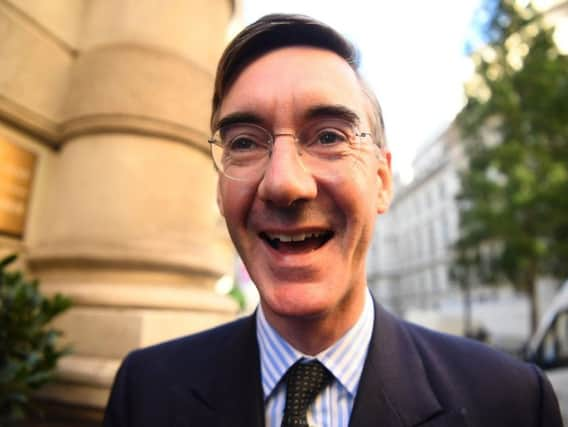Eight nominations for Jacob Rees-Mogg's list of banned words – Bill Jamieson


To the bemused puzzlement of many, the new Leader of the House of Commons, Jacob Rees-Mogg (or as he would prefer, the Rt Hon Jacob Rees-Mogg Esq. MP) has issued a style guide to staff members.
His rules include banning words as “very”, “due to”, “ongoing”, “unacceptable”, “equal”, “yourself”, “invest” (as in schools etc.,.), “no longer fit for purpose” and “meet with”.
Advertisement
Hide AdAdvertisement
Hide AdWhat hoots of derision this has drawn. Critics wasted no time to resurrect his nickname: the “Honourable Member for the 18th Century”.
Pedantic? Snobbish? Out of date? But how right he is, and how popular his admonitions will be among those who have to suffer the daily assault of mindless terms and buzzword jargon. As for his request to use imperial measurements – hooray!
We should cheer this initiative to the echo. For our language, one of the richest and most beautiful in the world is under relentless assault from the bureaucratic and jargon-ridden effusions of the political and corporate worlds – much of it overlain with a faux mateyness to disarm their audiences.
Yet the drones are taking over, with their vague, evasive, dead-on-arrival words and phrases – over-used to the point as to have lost not just their force but their meaning. Their repetition goes so unchallenged they have entered the commonplace.
It is high time we made more of an effort to combat this infection. And here I must enter a mea culpa, for in 40 years in journalism I have personally succumbed to the thoughtless repetition of words and phrases that slip in without care and attention.
Is Rees-Mogg so out of touch? Some years ago I wrote a series of columns in the Scotsman business section on business world clichés. It provoked a terrific response from readers who had their fill of them at corporate and government conferences. Letters and emails citing egregious examples poured in for weeks. It is not simply the blighting of a wonderful language that riles. There is the challenge to comprehension, the obscuring or blurring of meaning, the cluttering of clear thought by a language of frosted glass.
What we are suffering is not just poor use of language. It is an inflation of words and terms – particularly evident in the grandiosity of title and function evident across the public administration as well as the business world.
Campaigns for better English are driven by more than concern over the beauty of clear language, noble though this is as a cause. It is also to do with good government in the broadest sense. We wish for government that is clear in its explanations and its actions. Without it, we are at the mercy of the confused, the muddled, the ambiguous – and the Machiavellian.
Advertisement
Hide AdAdvertisement
Hide AdSo to the list of Jacob Rees-Mogg’s banned words and phrases I would add several more – as I suspect many thousands have also mentally done.
‘Over-arching’: a portentous term for ‘overall’, often accompanied at conferences by expansive arm movements by the speaker; frequently cited with ‘holistic’.
‘On a journey’: often used to disguise failure to achieve target; see also ‘route map’, indicating a road hitherto untraveled and invisible to most.
‘Diversity’: a consolation prize for the absence of consensus.
‘Legacy’ (as in leave a lasting one): the next government will pick up the bill.
‘Excellence for all’: an oxymoron.
‘Civic collaboration’: a term often used to disguise murderous in-fighting and tribalism, as in ‘Glasgow-Edinburgh collaboration’.
‘Inappropriate’: a term to express disapproval without the requirement to specify what or why exactly something is so deemed.
‘Sustainable’: a term now occupying the loftiest position in the towering Babel of buzzwords. Can be stuck in front of almost any physical asset or activity. Like the word ‘social’ as in ‘social justice’, ‘social housing’ and ‘social enterprise’, its very ubiquity has robbed it of meaning while corrupting the principle or activity to which it is attached.
Advertisement
Hide AdAdvertisement
Hide Ad‘Sustainable economies’? But economies are continually changing and adapting to grow. ‘Sustainable housing’? Construction that’s ‘built to last’ seldom outlives changes in building technology and consumer tastes for the new and different. ‘Sustainable communities’? The very essence of a community is its ability to change and adapt – note also the constant creation of new communities as old ones decay.
And then there is the ubiquity of the word that renders it meaningless. Drive along the M8 or the M6 and we see ‘sustainable’ plastered on the sides of juggernauts, as in “Delivering Sustainable Logistics Solutions”! It’s a lorry, for Heaven’s sake.
How much better it would be if every juggernaut had Jacob Rees-Mogg’s banned list emblazoned on the side.
Dear Scotsman Editor Esq.: I do pledge to deliver fit-for-purpose ongoing articles on a sustainable basis – going forward.
